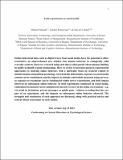Field Experiments on Social Media
Author(s)
Mosleh, Mohsen; Pennycook, Gordon; Rand, David G
DownloadAccepted version (647.2Kb)
Open Access Policy
Open Access Policy
Creative Commons Attribution-Noncommercial-Share Alike
Terms of use
Metadata
Show full item recordAbstract
<jats:p> Online behavioral data, such as digital traces from social media, have the potential to allow researchers an unprecedented new window into human behavior in ecologically valid everyday contexts. However, research using such data is often purely observational, which limits its usefulness for identifying causal relationships. Here we review recent innovations in experimental approaches to studying online behavior, with a particular focus on research related to misinformation and political psychology. In hybrid lab-field studies, exposure to social-media content can be randomized, and the impact on attitudes and beliefs can be measured using surveys, or exposure to treatments can be randomized within survey experiments, and their impact on subsequent online behavior can be observed. In field experiments conducted on social media, randomized treatments can be administered directly to users in the online environment (e.g., via social-tie invitations, private messages, or public posts) without revealing that they are part of an experiment, and the effects on subsequent online behavior can then be observed. The strengths and weaknesses of each approach are discussed, along with practical advice and central ethical constraints on such studies. </jats:p>
Date issued
2022Department
Sloan School of Management; Massachusetts Institute of Technology. Institute for Data, Systems, and Society; Massachusetts Institute of Technology. Department of Brain and Cognitive SciencesJournal
Current Directions in Psychological Science
Publisher
SAGE Publications
Citation
Mosleh, Mohsen, Pennycook, Gordon and Rand, David G. 2022. "Field Experiments on Social Media." Current Directions in Psychological Science, 31 (1).
Version: Author's final manuscript